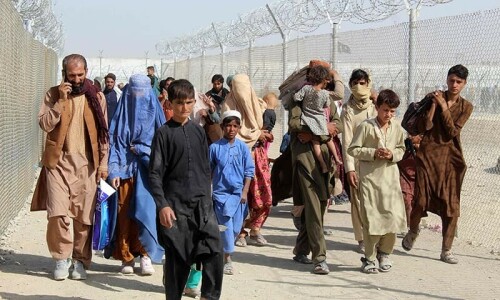LEERING, lewd remarks, being whistled at and touched are part and parcel of a Pakistani woman’s daily commute on public buses and at bus stops. Restricted mobility, to a great extent because of this harassment, is preventing her from continuing her education or seeking work outside of home.
In 2020, it was the bus rapid transit that helped 23-year-old Mahjabeen pursue her dream of becoming a botanist in Peshawar. Her father allowed her to continue her postgraduate degree, because the new bus stopped right at her university’s gate.
For far too long, public transport, including its planning and design, and investment in it, has been looked at through the male lens. That is because the decision-making process is rarely informed by equity or gender-based mobility needs and experiences. This is further reinforced by a workforce that is predominantly male.
That is perhaps the reason why the element of safety from harassment has never been incorporated in designs, if you ask Dr Hadia Majid, associate professor at the Lahore University of Management Sciences, who has been researching women’s mobility and its link to their work outside of home. One of the reasons for the dismal labour force participation score of 22 per cent (a dip from 24pc in 2015), which is among the lowest in the world according to World Bank data, could be the fact that women feel wary about travelling alone in public buses and are reluctant to take up paid work. By and large, urban spaces, transport and services are designed for men as women remain invisible, explained Dr Majid.
The buses need to continue to cruise.
Women in Pakistan rarely ride bicycles or motorcycles and they often consider rickshaws and cabs unsafe if they are alone. Shared buses and vans do have separate sections for women, but the latter say they are always bracing themselves for an untoward experience. These perceptions discourage them, or in many cases, family members stop them from travelling on these vehicles.
In fact, had our public transport been clean, efficient and safe, the Sindh government would not have had to launch a women-only bus service in Karachi earlier this month. These nine-metre-long six pink buses, equipped with cameras, will initially cruise from Model Colony to Tower en route to Sharea Faisal, Metropole and I.I. Chundrigar Road, the business hub of the city, every 20 minutes, during rush hour from 7am to 10am and then from 4pm to 7pm, for a flat fee of Rs50.
This is not the first time that a province has started this service. Back in 2012, the Punjab Transport Company had launched a similar service in Lahore, which was discontinued in 2014. Welcoming the idea of an exclusive bus service for women in a ‘hostile’ public space where women experience high levels of harassment, Dr Majid said Sindh would do well to ask why it failed in Punjab and how not to make the same mistakes.
Women-exclusive buses can give confidence to women to study — the route will help decide the location. These buses will also help women make decisions on taking up work outside the home, to look for jobs they like rather than just trying to look for one which is closer to home. The key to the success of the new pink bus service in Karachi could be continuity in planning. Vision 2025 had proposed an increase in women’s labour force participation rate to 45pc. If that target is to be achieved, the buses need to continue to cruise, irrespective of whoever is in government.
But there is a downside to this bus service. It shows we are brushing the unpleasant cause — men’s behaviour — under the carpet and admitting failure by implicitly condoning it. There needs to be a firmer way of handling this, as naming and shaming, mostly by women, on social media alone has certainly not ended men’s unbecoming conduct. There must be exemplary punishment handed out by the state to these offensive individuals.
In addition, said Dr Majid, there was a danger that such segregation may strengthen the notion that men and women have separate spaces, and the twain shall not meet. There is a need to move towards integration, she suggested.
It would, however, be amiss to invest in making women’s travelling safely by just providing women with a segregated bus service without infrastructural improvements. Experts point to improvement of last-mile connectivity — the 15-minute distance that women must walk between their home and the bus stop — to ensure their travel is completely secure.
In addition, a well-lit street and bus stop lighting, effective police patrol in lonely streets and public toilets can help make the last stretch of the travel safer. But to bring about these changes, it would help to encourage women to join all sections of this very male-dominated public transit sector itself. If women are placed at the helm, decisions made will be less gendered.
The writer is a Karachi-based independent journalist.
Published in Dawn, February 11th, 2023













































